 Petzlover
Petzlover Australian Red Heeler is originated from Australia but Berger Blanc Suisse is originated from Switzerland. Australian Red Heeler may grow 15 cm / 5 inches shorter than Berger Blanc Suisse. Australian Red Heeler may weigh 24 kg / 52 pounds lesser than Berger Blanc Suisse. Australian Red Heeler may live 3 years more than Berger Blanc Suisse. Both Australian Red Heeler and Berger Blanc Suisse has almost same litter size. Both Australian Red Heeler and Berger Blanc Suisse requires Moderate Maintenance.
Australian Red Heeler is originated from Australia but Berger Blanc Suisse is originated from Switzerland. Australian Red Heeler may grow 15 cm / 5 inches shorter than Berger Blanc Suisse. Australian Red Heeler may weigh 24 kg / 52 pounds lesser than Berger Blanc Suisse. Australian Red Heeler may live 3 years more than Berger Blanc Suisse. Both Australian Red Heeler and Berger Blanc Suisse has almost same litter size. Both Australian Red Heeler and Berger Blanc Suisse requires Moderate Maintenance.
 When George Hall arrived in the New South Wales Colony in 1802 he set about ‘creating’ a tough working- or herding dog. By crossing Australia’s native Dingoes with Collies as well as with other herding dogs, the robust Red Heeler, also known as the Australian Cattle Dog came into being. Today he is a thick-set dog, ideally suited to working livestock.
When George Hall arrived in the New South Wales Colony in 1802 he set about ‘creating’ a tough working- or herding dog. By crossing Australia’s native Dingoes with Collies as well as with other herding dogs, the robust Red Heeler, also known as the Australian Cattle Dog came into being. Today he is a thick-set dog, ideally suited to working livestock.
Ranchers, particularly, were impressed with the breed’s toughness and they were sought after on cattle stations. The name actually comes from them when the dogs are herding animals, they nip at their heels to get them moving.
The Blue Heeler and the Red Heeler breed are the exact same dog, but just different colors. These Australian cattle dogs originated in Australia in the mid-1800s and adapted well to the harsh desert environment of the outback.
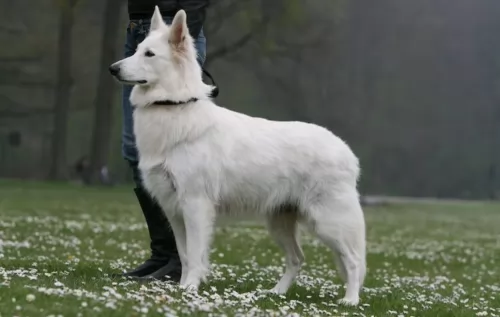 The Berger Blanc Suisse is also referred to as the White Swiss Shepherd. The dog shares the same ancestry with the German Shepherd. The beautiful white dog from Switzerland, is closely related to the White Shepherd. Both breeds are descended from the German Shepherd breed.
The Berger Blanc Suisse is also referred to as the White Swiss Shepherd. The dog shares the same ancestry with the German Shepherd. The beautiful white dog from Switzerland, is closely related to the White Shepherd. Both breeds are descended from the German Shepherd breed.
It was in 1967 that a certain Agatha Burch brought a White German Shepherd with her to Switzerland and also importing a female white German Shepherd from the UK. It was these 2 dogs who were believed to be the first breeding dogs for the Berger Blanc Suisse. After a number of years, the breed was officially recognized in July 2011. In the USA and Canada, these White Shepherd dogs have been accepted as a distinct breed.
 The Red Heeler or Australian Cattle Dog is a sturdy, muscular dog with ears that are pricked and with dark, alert eyes. The tail is long. The neck, shoulders and legs of the Red Heeler are strong and muscular. The dog is longer than tall – the length of the body is greater than the height at the withers. A well fed, well exercised, well cared for Red Heeler will weight roughly 15–22 kilograms.
The Red Heeler or Australian Cattle Dog is a sturdy, muscular dog with ears that are pricked and with dark, alert eyes. The tail is long. The neck, shoulders and legs of the Red Heeler are strong and muscular. The dog is longer than tall – the length of the body is greater than the height at the withers. A well fed, well exercised, well cared for Red Heeler will weight roughly 15–22 kilograms.
There are 2 coat colours of the Reeler – red and blue, but there are are lesser varieties such as chocolate, cream, blue mottled, brindle and some with white markings. It is interesting to note that with both the Red- and the Blue Heeler, puppies are generally born white, with the coat turning to red as they mature.
These Australian Cattle Dogs display patches of solid colour, and you might well find masks over one or both eyes and a white tip to the tail. Both the Red and Blue Heeler can have a white star on the forehead which is referred to as the Bentley Mark. The Heelers have a double coat - short, straight outer hairs while the undercoat is short, fine and dense. Despite their short coat, they shed a lot.
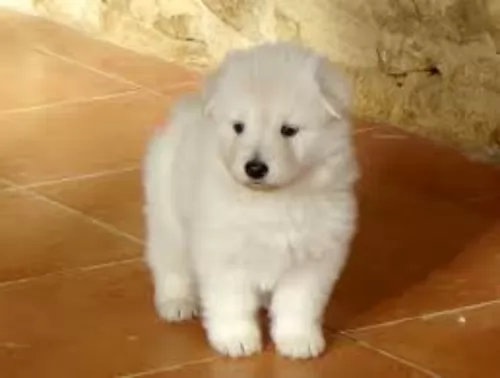 The medium-sized, well muscled Berger Blanc Suisse looks so much like the popular German Shepherd, and apart from its white coat, it has much the same physical standards. The females are about 55–61cm in height while the males are 60–66cm in height. The dogs dense, medium-length double coat tends to be slightly wavy but straight is more common. He has a long bushy tail.
The medium-sized, well muscled Berger Blanc Suisse looks so much like the popular German Shepherd, and apart from its white coat, it has much the same physical standards. The females are about 55–61cm in height while the males are 60–66cm in height. The dogs dense, medium-length double coat tends to be slightly wavy but straight is more common. He has a long bushy tail.
The Berger Blanc Suisse is somewhat longer than it is tall, but like the German Shepherd, it also has erect ears. In contrast to the white coat, the nose is black and the dog had dark, alert eyes.
This is an intelligent, confident dog and if you buy a puppy, of which the average litter size is 8, you will need to provide training and socialization to ensure he doesn't act totally independently and behave in a manner not pleasing to you. Once he is trained and socialized, he makes a wonderful pet and is social, playful and gentle. He is loyal and devoted to his human family, wanting to protect them. He is good around children and other pets in the home.
 Your Australian Red Heeler needs plenty of exercise but also plenty of companionship too from his human family. He is an affectionate, playful pet but is reserved with people he doesn’t know. When socialized he is patient with children in the home but he does still have the tendency to herd them and nip at their heels. The dog builds up a strong bond with his human family, and is protective toward them, being happy to be close to his owner’s side.
Your Australian Red Heeler needs plenty of exercise but also plenty of companionship too from his human family. He is an affectionate, playful pet but is reserved with people he doesn’t know. When socialized he is patient with children in the home but he does still have the tendency to herd them and nip at their heels. The dog builds up a strong bond with his human family, and is protective toward them, being happy to be close to his owner’s side.
Red Heelers need activities and lots of room to play, and they therefore won’t adapt to apartment living. If you don’t live on a farm, don’t neglect your working dog as he will need lots of rough and tumble games and activities to keep him from boredom. Treat your Australian Red Heeler with the love, patience and kindness and you’ll bring out the very best from this active, loyal fur-friend of yours.
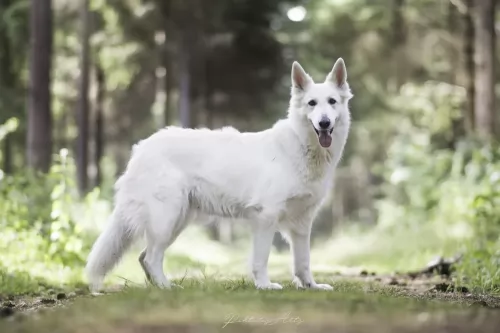 When you first set eyes on the Berger Blanc Suisse or White Shepherd, you can see that this is a strong, well-muscled, energetic dog, full of life and intelligent too. Add to that the fact that he is beautiful to look at.
When you first set eyes on the Berger Blanc Suisse or White Shepherd, you can see that this is a strong, well-muscled, energetic dog, full of life and intelligent too. Add to that the fact that he is beautiful to look at.
Your Berger Blanc Suisse dog is gentle and loyal with his own human family and will be somewhat wary of strangers. This dog is balanced, good-natured, friendly and affectionate and he just loves spending time with his family, being a good watch dog as well. He’s got so much going for him – good looks, a great personality, he is loyal, loving, strong, healthy and he’ll make one hang of a pet.
 The Australian Cattle Dog is quite often affected by progressive retinal atrophy, an eye condition where the rods and cones in the retina of the eye deteriorate later in life, and it could lead to blindness. This eye illness is an autosomal recessive trait, and even if the dog doesn’t develop the condition himself, he can be a carrier of the affected gene.
The Australian Cattle Dog is quite often affected by progressive retinal atrophy, an eye condition where the rods and cones in the retina of the eye deteriorate later in life, and it could lead to blindness. This eye illness is an autosomal recessive trait, and even if the dog doesn’t develop the condition himself, he can be a carrier of the affected gene.
The Heeler is just bursting with personality and energy and a study of dogs diagnosed at veterinary colleges described fractures and ligament tears as one of the most common conditions treated with the Australian Red Heeler.
You love your Australian Red Heeler and you want to take good care of him. Check with your vet because at 8 weeks he should be starting with his first puppy vaccinations.
To keep your best friend healthy and happy, watch his diet, ensure he gets plenty of exercise, brush his teeth regularly to remove plaque build-up, and always call your veterinarian when you see he is ill and isn’t his usual boisterous self.
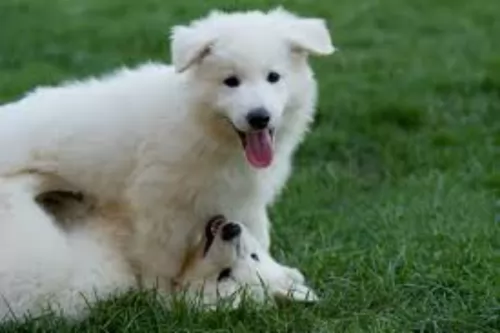 Your White Swiss Shepherd is a healthy, energetic, strong dog, but even so when you find him lethargic and listless, you want to get him to the vet for a check-up. It is always a good idea to be alert to common dog illnesses so that you know what to look out for in your dog.
Your White Swiss Shepherd is a healthy, energetic, strong dog, but even so when you find him lethargic and listless, you want to get him to the vet for a check-up. It is always a good idea to be alert to common dog illnesses so that you know what to look out for in your dog.
A common problem with dogs. The dog becomes restless and the abdomen is often enlarged. Get your dog to the doctor immediately.
This is a developmental defect of the hip and elbow joints and you’ll notice your pet battling to rise again after lying down.
This is a disease of the nervous system where the hind legs and feet drag. Sometimes the dog loses control over the bladder.
 The Australian Red Heeler is a low maintenance dog. He does shed quite a bit so you’ll need to brush his coat at least twice a week to remove loose hairs and to keep his coat lustrous. When your dog has been in a particularly dusty area, you you wipe his coat down with a damp cloth. As with all dogs, you’ll want to check his teeth, ears, eyes and nails regularly to avoid health problems.
The Australian Red Heeler is a low maintenance dog. He does shed quite a bit so you’ll need to brush his coat at least twice a week to remove loose hairs and to keep his coat lustrous. When your dog has been in a particularly dusty area, you you wipe his coat down with a damp cloth. As with all dogs, you’ll want to check his teeth, ears, eyes and nails regularly to avoid health problems.
If you care for your working- and herding dog you’ll train him to that he becomes a good family dog and companion. The Red Heeler has plenty of energy and stamina and if he grows up untrained and un-socialized, you could see him becoming aggressive towards other animals and even your own children. He certainly becomes over-protective of his territory if not socialized. Train him as he is an intelligent breed and responds well to training.
Any vet will tell you of the critical importance of a proper diet and exercise routine for your dog. He’s an active, smart dog with loads of energy and you want to keep his diet consistent with this energy. Speak to your vet about what food would suit your pet best, because a high quality diet appropriate to his age, his body size and his energy levels will be important. Along with high quality foods which include a good intake of raw meat, your dog must always have access to a bowl of fresh, cool water.
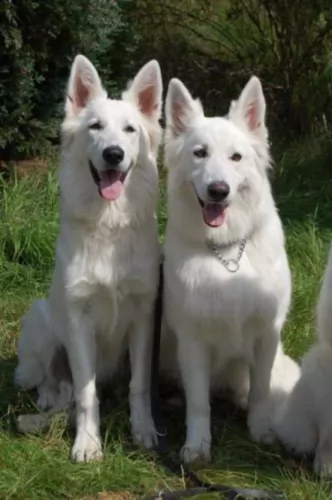 Apart from your Berger Blanc Suisse puppy need an excellent quality puppy food 4 times a day, as he gets older you will need to adjust his food to suit his high energy needs. Once your pet reaches a year of age you will know whether he requires one or two helpings of food a day. You can feed him a top quality commercial manufactured food or you can make your own home-made food for him which includes meat, rice and vegetables.
Apart from your Berger Blanc Suisse puppy need an excellent quality puppy food 4 times a day, as he gets older you will need to adjust his food to suit his high energy needs. Once your pet reaches a year of age you will know whether he requires one or two helpings of food a day. You can feed him a top quality commercial manufactured food or you can make your own home-made food for him which includes meat, rice and vegetables.
You want to make 100% sure he is getting the correct dosage of minerals and vitamins to ensure good health. To keep his eyes bright and his nose wet, include some raw meat into his diet as well. Make sure that he always has access to fresh, cool water.
Remember that your Berger Blanc Suisse is a working dog and he will need plenty of exercise. Apart from taking him on long walks, you can throw balls for him, buy rope toys for him and give him some rough and tumble. He is an intelligent breed and he will require some games that give him mental stimulation too.
Check regularly for fleas and ticks. You’ll pick this up with brushing his beautiful coat. Frequent brushing will help keep your dog clean and also remove all those loose hairs. Your White Swiss Shepherd Dog is a moderate, but constant shedder as well as being a heavy seasonal shedder so you will need to give him a good brush at least twice a week.